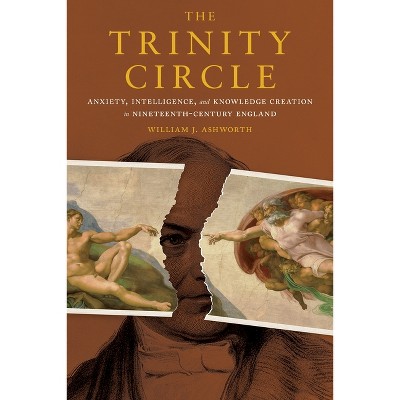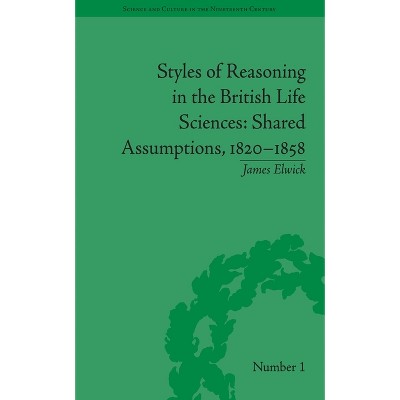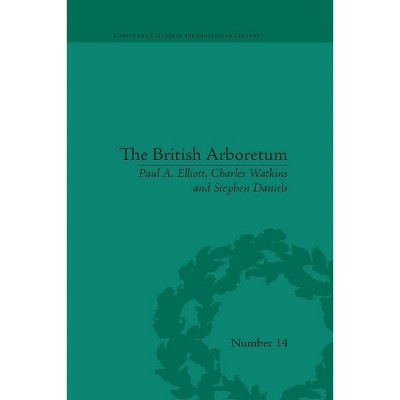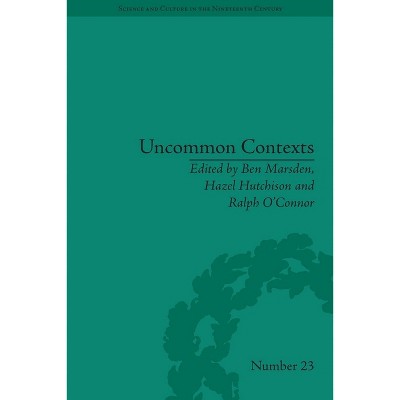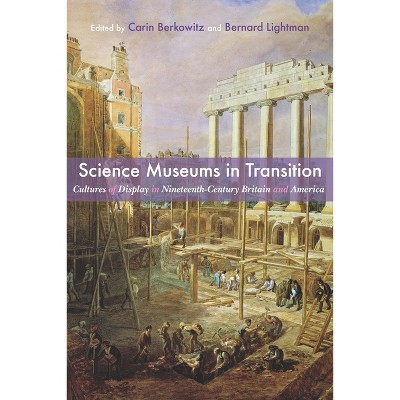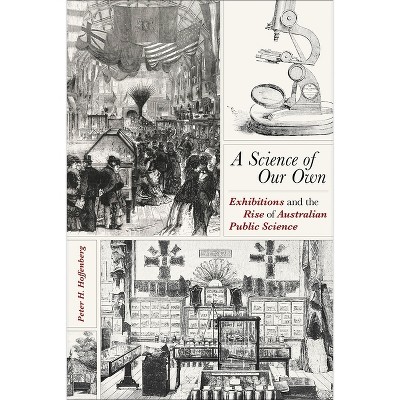Science, Religion, and the Protestant Tradition - (Sci & Culture in the Nineteenth Century) by James C Ungureanu (Paperback)

$35.00 when purchased online
Target Online store #3991
About this item
Highlights
- The story of the "conflict thesis" between science and religion-the notion of perennial conflict or warfare between the two-is part of our modern self-understanding.
- About the Author: James C. Ungureanu is Upper School humanities teacher at The Stony Brook School in New York.
- 368 Pages
- Science, History
- Series Name: Sci & Culture in the Nineteenth Century
Description
About the Book
Revisiting the Origins, Development, and Popularization of the "Conflict Thesis"Book Synopsis
The story of the "conflict thesis" between science and religion-the notion of perennial conflict or warfare between the two-is part of our modern self-understanding. As the story goes, John William Draper (1811-1882) and Andrew Dickson White (1832-1918) constructed dramatic narratives in the nineteenth century that cast religion as the relentless enemy of scientific progress. And yet, despite its resilience in popular culture, historians today have largely debunked the conflict thesis. Unravelling its origins, James Ungureanu argues that Draper and White actually hoped their narratives would preserve religious belief. For them, science was ultimately a scapegoat for a much larger and more important argument dating back to the Protestant Reformation, where one theological tradition was pitted against another-a more progressive, liberal, and diffusive Christianity against a more traditional, conservative, and orthodox Christianity. By the mid-nineteenth century, narratives of conflict between "science and religion" were largely deployed between contending theological schools of thought. However, these narratives were later appropriated by secularists, freethinkers, and atheists as weapons against all religion. By revisiting its origins, development, and popularization, Ungureanu ultimately reveals that the "conflict thesis" was just one of the many unintended consequences of the Protestant Reformation.Review Quotes
Ungureanu proposes a persuasive new reading of the two figures, and in the process he reveals fascinating understudied dimensions of the history of liberal Protestantism.-- "Journal of Religion"
In a time of alternative facts, rampant conspiracy theories, climate change denial, and an apparent upsurge in flat-earthers, it is a breath of fresh air to read James Ungureanu's erudite analysis of why so many people came to believe, and still do, that religion and science are implacable enemies. In six eminently readable chapters and an excellent summary conclusion. . . . Ungureanu's book makes an important contribution to understanding the role the Protestant Reformation played in paving the way for modernity and setting the stage for secularism.-- "Church History"
James Ungureanu has undertaken extraordinarily exhaustive research and produced a book that offers an insightful, refreshing re-evaluation of two of the most influential figures in the modern history of religion and science. This book promises to reshape how historians understand the origin of the conflict thesis.--David Mislin, Temple University
Meticulously researched and routinely insightful, this book provides a refreshing contribution to the historiography of the 'conflict thesis' and develops a compelling argument for historians of science to give more weight to religious history when appraising matters of science and religion. Albeit aimed at the Protestant tradition, Ungureanu's work proffers a veritable treasure trove of Western intellectual history and, as such, speaks to a much wider audience.-- "Isis"
Ungureanu . . . draws out the distinct positions held by Draper and White in enough detail to convince a reader that something other than a simple conflict between science and religion was being addressed in their work. His own work is comprehensively presented, meticulously documented, and exhaustively referenced.-- "Reading Religion"
Ungureanu develops an arresting reinterpretation of John William Draper and Andrew Dickson White, traditionally perpetrators of the 'conflict thesis, ' but whose intentions, he argues, were not to attack 'religion' but to protect its progressive forms from obstructive theological orthodoxies. I highly recommend this book, which is particularly important for historians of liberal Protestantism and its secularizing legacy in late nineteenth-century Anglophonic debates about 'science and religion.'--John Hedley Brooke, University of Oxford
Ungureanu manages that most difficult task facing scholars writing for their own, as well as a more general readership, to keep up his narrative's momentum and readability while at the same time refusing to trivialize or take short cuts. He does this very well, unfolding fascinating aspects of the emerging backdrop to Draper and White, such as the predominantly Anglo-American influences of the former and Germanic of the latter. The back-to-back chapters contrasting Anglican and American ecclesiastical responses to science are well-crafted, for example. But this is done as we delve into detail and read correspondence, tracts and less well-known. The major thesis, that the warfare narrative constitutes a major backfiring of an attack from one (liberal) wing of Christianity against another (conservative), unfolds with the inevitability of a slow-motion railroad crash. The reader can palpably feel the frustration of the avowed secularists who could not understand why Draper and White would not or could not see that their 'purified (of theological doctrine) Christianity' occupied a 'land of bunk'.-- "Tom McLeish, University of York"
Ungureanu's book is well written, an impressive piece of scholarship and will be essential reading for anyone who wants to understand the origins of the conflict narrative.-- "Science & Christian Belief"
Ungureanu's is relevant history. . . . This is fine scholarship, dense, detailed, and documented. . . . It is also well written, with frequent pauses to review arguments and conclusions, and persuasive. Required reading for historians, this work should also interest nonspecialists curious about the complex origins of the infamous conflict thesis, its ideological uses, and the value of the history of religion for historians of science.-- "Perspectives in Science and Christian Faith"
About the Author
James C. Ungureanu is Upper School humanities teacher at The Stony Brook School in New York. He also serves as unit coordinator of religion and science for the Upper Midwest Region of the American Academy of Religion.Dimensions (Overall): 9.0 Inches (H) x 6.0 Inches (W) x .92 Inches (D)
Weight: .98 Pounds
Suggested Age: 22 Years and Up
Number of Pages: 368
Genre: Science
Sub-Genre: History
Series Title: Sci & Culture in the Nineteenth Century
Publisher: University of Pittsburgh Press
Format: Paperback
Author: James C Ungureanu
Language: English
Street Date: April 30, 2024
TCIN: 1004357355
UPC: 9780822967415
Item Number (DPCI): 247-40-9807
Origin: Made in the USA or Imported
If the item details aren’t accurate or complete, we want to know about it.
Shipping details
Estimated ship dimensions: 0.92 inches length x 6 inches width x 9 inches height
Estimated ship weight: 0.98 pounds
We regret that this item cannot be shipped to PO Boxes.
This item cannot be shipped to the following locations: American Samoa (see also separate entry under AS), Guam (see also separate entry under GU), Northern Mariana Islands, Puerto Rico (see also separate entry under PR), United States Minor Outlying Islands, Virgin Islands, U.S., APO/FPO
Return details
This item can be returned to any Target store or Target.com.
This item must be returned within 90 days of the date it was purchased in store, shipped, delivered by a Shipt shopper, or made ready for pickup.
See the return policy for complete information.
Trending Poetry

Bestseller
$24.48
MSRP $35.00
Buy 2, get 1 free select books, movies, music & Funko
4.7 out of 5 stars with 27 ratings

Bestseller
$14.39
Buy 2, get 1 free select books, movies, music & Funko
3.8 out of 5 stars with 63 ratings

$22.80
was $26.60 New lower price
Buy 2, get 1 free select books, movies, music & Funko
5 out of 5 stars with 4 ratings

$23.09
Buy 2, get 1 free select books, movies, music & Funko
4.5 out of 5 stars with 14 ratings

$23.09
Buy 2, get 1 free select books, movies, music & Funko
4.1 out of 5 stars with 17 ratings

Highly rated
$9.85 - $23.09
MSRP $15.99 - $32.99
Buy 2, get 1 free select books, movies, music & Funko
4.8 out of 5 stars with 137 ratings
